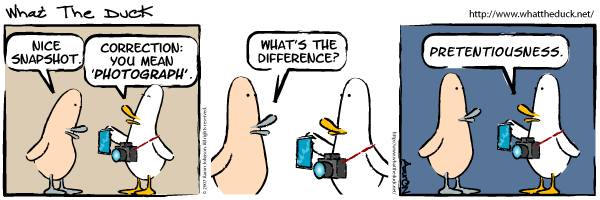-
Photographers Are Terrorists

I hope you read the subject of this article and gasped. I hope that your first reaction was indignance or perhaps anger. I share your feelings, but we photographers continuously deal with a level of public distrust and scrutiny that should worry us all. It’s important, whether you’re an amateur or a professional, to know what your rights are and to stand up for them so they don’t erode into nothingness, leaving us all standing there with our cameras and nothing to point them at.
Today I’m going to talk about photographers’ rights, a topic discussed in many other forums and at great length. My focus will be on United States laws: what you are legally permitted to photograph; what, if any, argument you should be willing to put up with from certain officials; and some of my own experiences.
Please come in, photography is allowed.
-
Resolution Is a Myth: Calculating DPI

Many people ask me, “What’s the best resolution?” Not only is the most important part of that question missing (best resolution for what?) but it’s marinaded in thick and juicy misconceptions about what resolution really means.
Resolution is a myth.
-
Finally, Photoshop Lightroom 1.1!

Adobe has finally released the first upgrade package for Photoshop Lightroom, which brings us to version 1.1. I say “finally” because this upgrade introduces at least one feature that we hoped against hope would be in the first release, the ability to merge libraries, among other enhancements.
First, if you have Lightroom and it hasn’t already popped up and told you to download the upgrade, you should seriously click over there and do that.
-
Photography: What's the Point?

Thanks to Aaron Johnson of What the Duck for this eloquent visual synopsis of what I’ve been thinking about lately. Too often we get so deeply embroiled in our craft that we forget why we do it.
A debate has been raging for days on Usenet.org/wiki/Usenet over the question of whether photography is art and, if so, when it becomes art. Although the very discussion is futile and has no practical outcome, I do think it’s important to take a step back from what you’re doing and think about what it is you’re gaining from it. This is going to be a heady philosophical post so if that’s not your particular brand of vodka, read some photo news instead.
-
Creative Commons: Good Idea?
Is it a good idea to give away work for self-promotion? Can you realize secondary gains from charity? I like to think of myself as a charitable person; my stance has typically been to give things away in the name of recognition rather than lock them up and hope to find a market for them in the future. I’d rather let the world see my work and appreciate it than stand on principle and be completely unrecognized.
That said, everyone has a different threshold of charity, and that threshold seems to be linked to their success and recognition. Completely unrecognized people give things away to gain exposure. After achieving success, they often stop giving things away to maximize their gains. Then, if they become very successful, they may begin giving things away again because they can afford to.
Because there are so many nuances to the ways in which creators may wish for their work to be used by others, the Creative Commons emerged, creating whole new gradations within the copyright system. Now, rather than saying “all rights reserved,” we can easily say “some rights reserved” and call upon a pile of pre-written legalese. Good idea?
 Single-Serving Photo
Single-Serving Photo